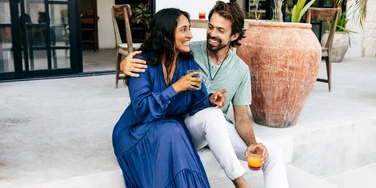I’m removing myself from the daily grind, hitting the “reset” button, and getting some much-needed perspective. Just like some workplaces recognize that employees get burnt out after many years on the job, I’m recognizing that many years of marriage have left me similarly depleted.
Of course, most people would describe my present circumstances as “being separated” from my husband of nearly 16 years. Most people would consider separation to be a likely precursor of divorce, and divorce to be the byproduct of a failed marriage.
I’m currently on sabbatical from my marriage.
Perhaps I’m feeling particularly defensive at this point, but it’s a term we would rarely apply to anything else we’ve worked at, and largely “succeeded” at (whatever that means), for two decades.
Over the last 16 years of marriage, as well as the four years before our wedding, my husband and I have co-parented my stepson and our two children, scraped by on my income to put my husband through college and then a doctorate program, pursued meaningful careers, purchased a home and three cars, and, as an interracial couple, united to fight the white patriarchy in its many ugly and infuriating forms.
 PeopleImages.com - Yuri A / Shutterstock
PeopleImages.com - Yuri A / Shutterstock
We’ve shared somewhere around 7,000 meals together, most of them nutritious; given one another at least 2,000 orgasms, none of them faked; and spent at least 3,000 hours on planes, trains, and automobiles to make memories and visit family. We’ve loved hard and laughed hard and cried hard. We’ve built a life and a family together, however chaotic or precarious it seems at times.
Even 20 years into our relationship, our daily interactions have remained largely affectionate. I still feel the same chemistry I felt the first time he smiled at me, revealing his signature dimples and the creases that spread like fans from the corners of his eyes.
But lately, the intermittent periods of marital drama have been getting less intermittent and more dramatic.
Like all couples, my husband and I have faced unique challenges based on the particular blend of personal histories and characteristics each of us brings to the table. Like all couples, we have faced other challenges that bear down on us from “out there” — the various isms that have cast their long shadows, the different ways we’ve been socialized because of our genders, the unrelenting pressure to keep the gears of capitalism grinding, the impossibility of finding sufficient time and energy to care for our children, ourselves, and each other.
The most concise explanation for our current separation is that we are, quite simply, spent.
You could say my husband hit his wall when he collapsed at work last summer and had to be transported by ambulance to the nearest hospital. He spent six months trying to recoup his energy and figuring out his next move.
During those six months, as I continued working my day job and figured out how to pay our bills while my caregiving and domestic duties quietly expanded, I did my best to act from a place of empathy and grace. Did I always succeed? Probably not, but I knew my husband needed space to confront the traumatic and complicated past that had seemed to catch up to him after years and years of breathless running.
I hit my wall gradually. I didn’t collapse; there was no ambulance involved. But eventually, a weekend arrived when I simply couldn’t do it anymore. If I got enmeshed in one more exhaustingly circular argument, I feared it might break me.
I’m not going to lie — as much as I want to celebrate the decision to take a marital sabbatical, I cannot shake a persistent feeling of failure.
I worry that if my husband and I do not find our way back to one another, I’ll be letting down not just our family but also all interracial couples everywhere. Not to mention all women who still believe in the promise of equitable heterosexual partnership.
At the end of the day, I fear I’ll be just another burned-out, disillusioned, educated white woman who couldn’t reconcile the unfulfilled vision of the “modern family” with its persistent realities.
I’m not, on the whole, angry with my husband. Yes, I’m occasionally furious with him — in fact, I’m currently furious with him — but I’m far more angry at the social forces that dictated we make lifelong vows to one another and then turned their attention to slowly sucking us dry.
I often wonder, what would our marriage look like now if we’d spent the last decade embedded in a supportive community? If our work and education hadn’t demanded so much of us? If the society in which we were parenting shared the values we were attempting to instill in our children? If the important work of caregivers was widely celebrated, equitably distributed, and fairly compensated? If we didn’t have to fear the police, struggle with crushing debt, or contend with the after-effects of chronic and complex childhood trauma?
I can’t say for sure, but I’d be willing to bet that I wouldn’t presently be writing this essay, alone in a small, dark apartment 65 miles from my home.
If marriage has taught me anything, it’s that there is always more than one way to look at the same thing.
In many ways, this small, dark apartment, where I’ve spent the last several weekends, has also been a gift. I’ve had more time to myself in the last few months than I’ve had in the last 13 years. During that time, I’ve hiked alone, eaten alone, puzzled alone, and yes, found myself with more alone time to write.
 Jacob Lund / Shutterstock
Jacob Lund / Shutterstock
I don’t think The Answer to my current predicaments necessarily lies in solitude. I don’t think I’ll ultimately find happiness by retreating. But I do know that I need to disconnect before I can figure out which connections are filling my cup and which connections are draining it.
For so long, I’ve walked around with the breath-crushing weight of it all, with stresses ranging from dizzyingly complex childcare, work, and transportation logistics; to the messages bearing down on my adolescent daughter about all the things “wrong” with her body, face, and hair; to the hardness I see developing behind my husband’s eyes and the intensity behind his words that fill me with an impending sense of dread.
And through it all, we still have to eat moderately nutritious food, wear moderately clean clothes (that fit), and keep a home organized enough that we can occasionally find things when we need them.
Don’t be a martyr, they say. Ask for help, they say. Then we try and we’re told to stop whining.
Don’t be a people pleaser, they say. Stand up for yourself, they say. Then we try and we’re told to sit down.
Women learn that in our warped society, connection comes at the expense of self. We can either be one of those untethered, liberated childfree women who answer to nothing and no one, or we can be a “good mom” who tends to everyone’s needs but her own.
In this small, dark weekend apartment, I have two changes of clothes, two pairs of shoes, and pajamas. I have a puzzle, a laptop, and a book. There is one set of dishes, one set of silverware, one teapot, and a cupboard with coffee, oatmeal, red wine, and tea. In the refrigerator, two beers and leftover pad thai. In the bathroom, my carefully proportioned travel toiletry kit, everything under 3.4 ounces.
It’s only in this apartment, and on the various trails I seek out during the day, that I can find the mental and emotional quiet to begin to unpack years and years of toxic socialization, to identify the behaviors I’ve brought to my marriage that have hurt more than helped, to feel what it’s like to exist only as myself and know that somewhere the grinding gears of our family are still turning.
Yes, I’m quite sure the food my children are getting fed is nominally nutritious and overpriced takeout, and yes I’m quite sure that screen time guidelines are not getting reinforced — but you know what? I’m not there to witness it, and it’s not all up to me.
Nobody needs me here. It feels liberating and also a little lonely. In the evenings, when the encroaching darkness lends a tinge of desperation to the solitude, I make phone calls. Yes, phone calls — remember those? I take deep breaths and tap the “call” button, always feeling guilty for interrupting other people’s routines, always anxious about burdening them with my problems, and always worried that my pain might make them uncomfortable.
I’m leveraging the emotional and mental bandwidth my solitude affords me to plant more seeds for connection. I’m forcing myself to be vulnerable.
They say we women are better at vulnerability, but we still like to put on a show, don’t we? We want to show the world we have it all together because that is what the world wants to see. That’s why we make sure our children wear matching socks, why we frantically clean before houseguests arrive, why we breezily refer to one another as supermoms, why we post endless photos of our “happy families” on social media and write drippy anniversary tributes to our husbands.
We’ve gotten better at being honest about motherhood over the last decade, but mostly in a “Mommy needs more wine, haha” kind of way. We haven’t necessarily gotten better at being vulnerable.
Over the last few months, I’ve talked to my sister, my parents, my aunt, my estranged stepson, my few friends, and various members of my Al-Anon recovery group. It’s amazing, how much time people will make for you when you get over your fear of asking. It’s amazing, how much better I feel after these conversations. It’s amazing, how many problems we think are ours alone until we open up and discover that countless others share in our pain.
The world might try its best to convince me that I’m failing at my marriage. But I’m here to tell you, I’m killing it when it comes to my separation.
I’m not relying on distance alone to “save” my marriage, but using the time and space to figure out who I am — without all the people pleasing and the martyrdom and the crushing sense of responsibility for everyone else’s well-being.
I’ve explored psychedelics to aid me in this journey, sought out my higher power amongst trees and sprawling views, and allowed myself to spend hours doing completely unproductive things, like reading novels, sobbing in bed, sitting with my thoughts, and sifting through puzzle pieces.
If you’d asked me a week ago whether or not I thought my husband and I would heal our way back to one another, I would have told you the outlook looked good. This week, I’m not so sure. The emotional waters of my current life range from pleasantly placid to violently volatile, sometimes in the stretch of a single afternoon. I’ve experienced more serenity, more grief, and more rage in the last few months than I’ve allowed myself to feel — or more accurately had time to feel — over the last few decades.
There’s no easy way to heal, or end, a marriage. But I am trying my best to convince myself that no matter where I emerge, I’ll be better off than I was before plunging myself into separation. I’ll have a stronger support network, a stronger sense of self, and a stronger spiritual connection to guide me when I lose my way. What does a “successful marriage” even look like these days?
Are we failing at marriage, or is marriage failing us?
Sure, I know a few couples who seem genuinely compatible, who have a strong foundation of shared values, who have figured out how to mutually support one another without sacrificing their sense of self, and who have the tools and the resources they need to gracefully manage periods of conflict and stress.
But these couples are the exception, not the rule. Most “successful marriages” I see seem to hinge on resentment that simmers but never boils, on quiet, or not-so-quiet, resignation. Maybe, at the end of the day, the trade-offs are worth it — and maybe not.
I’m not failing. I’m finding a way forward. Slowly and imperfectly, yes, in a two-steps-forward, one-step-back sort of way. And just as slowly and imperfectly, I’m detoxing and deprogramming. I’m disconnecting and deconstructing. All this time I spent, trying to “fix” or “save” my marriage and my husband and my family. All this time, not realize that the only thing I could fix or save was myself.
Kerala Taylor is an award-winning writer and co-owner of a worker-owned marketing agency. Her weekly stories are dedicated to interrupting notions of what it means to be a mother, woman, worker, and wife. She writes on Medium and has recently launched a Substack publication Mom, Interrupted.
This article was originally published at Substack. Reprinted with permission from the author.



